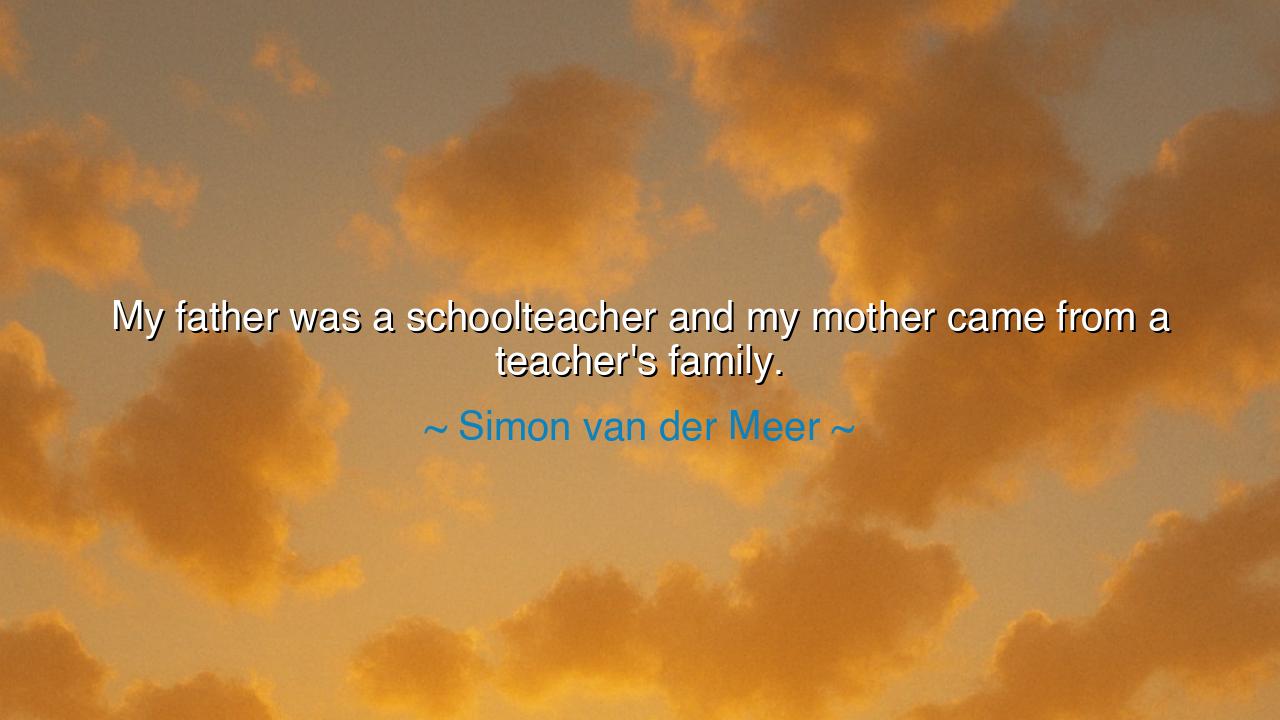
My father was a schoolteacher and my mother came from a






Hear, O seekers of truth, the words of Simon van der Meer, Nobel laureate of physics, who once spoke of his roots with humility: “My father was a schoolteacher and my mother came from a teacher’s family.” In these words lies more than a genealogy. It is a testimony to the soil from which greatness grows, a reminder that the destiny of a man is often nurtured not by kings or warriors, but by teachers—those quiet guardians of knowledge who shape minds, sow discipline, and kindle curiosity.
To be born into a family of teachers is to be surrounded by the reverence of learning, the patient rhythm of explanation, the sacred duty of passing wisdom to the next generation. His father, a schoolteacher, stood as one who tilled the soil of young minds. His mother, raised in a lineage of teaching, carried the values of diligence and study. From them he inherited not only intellect, but a spirit molded by patience, perseverance, and devotion to truth. Thus, when van der Meer ventured into the mysteries of science, he was already prepared—his path guided by the unseen hand of generations who valued knowledge above all.
This truth is echoed in history. Consider the family of Confucius, whose ancestors were known for their devotion to ritual and tradition. From such roots, he inherited a love of teaching that would one day shape the philosophy of nations. Or reflect upon John Adams, second president of the United States, whose lineage of Puritan ministers instilled in him a sense of duty and reverence for education, preparing him to shape a new republic. In each case, as with van der Meer, the greatness of the child was fertilized by the values of the family.
Yet there is a lesson also in humility. Van der Meer does not boast of titles, nor of power, nor of wealth. He recalls instead his father and mother, teachers both in blood and spirit. This shows us that true greatness does not rise from arrogance, but from remembrance. To honor one’s roots is to acknowledge that no one climbs the mountain alone. The laurels of the son rest upon the shoulders of those who taught him to read, to think, to persist.
The heart of this quote is that teaching is never wasted. A schoolteacher in a small town may believe their labor insignificant. Yet from such classrooms arise minds that change the world. The chalk-dust-stained hands of van der Meer’s father unknowingly prepared the hand that would one day help unlock the secrets of particle physics. The legacy of teaching does not end in the classroom; it ripples outward into discoveries, inventions, and revolutions that reshape all of humanity.
The lesson for us is this: never despise the humble origins of learning. If you are the child of teachers, honor their sacrifices, for they have planted seeds in you that you may not yet see. If you are a teacher yourself, take heart, for your labor may bear fruit in ways you will never witness. And if you are a student, remember that the knowledge passed to you is not a burden, but a torch handed down through generations, lighting your way forward.
Practical wisdom follows: cherish the teachers in your life. Thank them, honor them, carry forward their lessons. In your own life, become a teacher in spirit—whether to your children, your peers, or your community. Share what you know, not for recognition, but for the sake of the future. For as van der Meer’s words remind us, the true foundation of greatness is laid not in palaces or laboratories, but in the humble classrooms where teachers quietly shape eternity.
Thus, O children of tomorrow, remember this truth: the noblest inheritance is not wealth, but wisdom. To be born of teachers is to be born into a lineage of light. Walk with gratitude, build with discipline, and pass onward the torch of knowledge, so that future generations may say of you, as van der Meer said of his parents: “They were teachers—and through them, I learned to be.”






AAdministratorAdministrator
Welcome, honored guests. Please leave a comment, we will respond soon